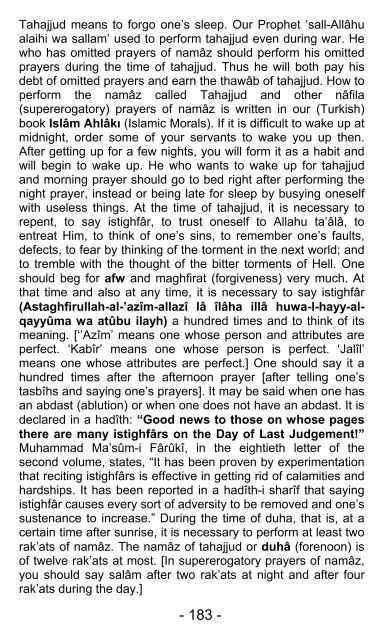1 - Endless Bliss - Hüseyin Hilmi Işık
1 - Endless Bliss - Hüseyin Hilmi Işık
1 - Endless Bliss - Hüseyin Hilmi Işık
Create successful ePaper yourself
Turn your PDF publications into a flip-book with our unique Google optimized e-Paper software.
Tahajjud means to forgo one’s sleep. Our Prophet ‘sall-Allâhu<br />
alaihi wa sallam’ used to perform tahajjud even during war. He<br />
who has omitted prayers of namâz should perform his omitted<br />
prayers during the time of tahajjud. Thus he will both pay his<br />
debt of omitted prayers and earn the thawâb of tahajjud. How to<br />
perform the namâz called Tahajjud and other nâfila<br />
(supererogatory) prayers of namâz is written in our (Turkish)<br />
book Islâm Ahlâkı (Islamic Morals). If it is difficult to wake up at<br />
midnight, order some of your servants to wake you up then.<br />
After getting up for a few nights, you will form it as a habit and<br />
will begin to wake up. He who wants to wake up for tahajjud<br />
and morning prayer should go to bed right after performing the<br />
night prayer, instead or being late for sleep by busying oneself<br />
with useless things. At the time of tahajjud, it is necessary to<br />
repent, to say istighfâr, to trust oneself to Allahu ta’âlâ, to<br />
entreat Him, to think of one’s sins, to remember one’s faults,<br />
defects, to fear by thinking of the torment in the next world; and<br />
to tremble with the thought of the bitter torments of Hell. One<br />
should beg for afw and maghfirat (forgiveness) very much. At<br />
that time and also at any time, it is necessary to say istighfâr<br />
(Astaghfirullah-al-’azîm-allazî lâ îlâha illâ huwa-l-hayy-alqayyûma<br />
wa atûbu ilayh) a hundred times and to think of its<br />
meaning. [‘’Azîm’ means one whose person and attributes are<br />
perfect. ‘Kabîr’ means one whose person is perfect. ‘Jalîl’<br />
means one whose attributes are perfect.] One should say it a<br />
hundred times after the afternoon prayer [after telling one’s<br />
tasbîhs and saying one’s prayers]. It may be said when one has<br />
an abdast (ablution) or when one does not have an abdast. It is<br />
declared in a hadîth: “Good news to those on whose pages<br />
there are many istighfârs on the Day of Last Judgement!”<br />
Muhammad Ma’sûm-i Fârûkî, in the eightieth letter of the<br />
second volume, states, “It has been proven by experimentation<br />
that reciting istighfârs is effective in getting rid of calamities and<br />
hardships. It has been reported in a hadîth-i sharîf that saying<br />
istighfâr causes every sort of adversity to be removed and one’s<br />
sustenance to increase.” During the time of duha, that is, at a<br />
certain time after sunrise, it is necessary to perform at least two<br />
rak’ats of namâz. The namâz of tahajjud or duhâ (forenoon) is<br />
of twelve rak’ats at most. [In supererogatory prayers of namâz,<br />
you should say salâm after two rak’ats at night and after four<br />
rak’ats during the day.]<br />
- 183 -




